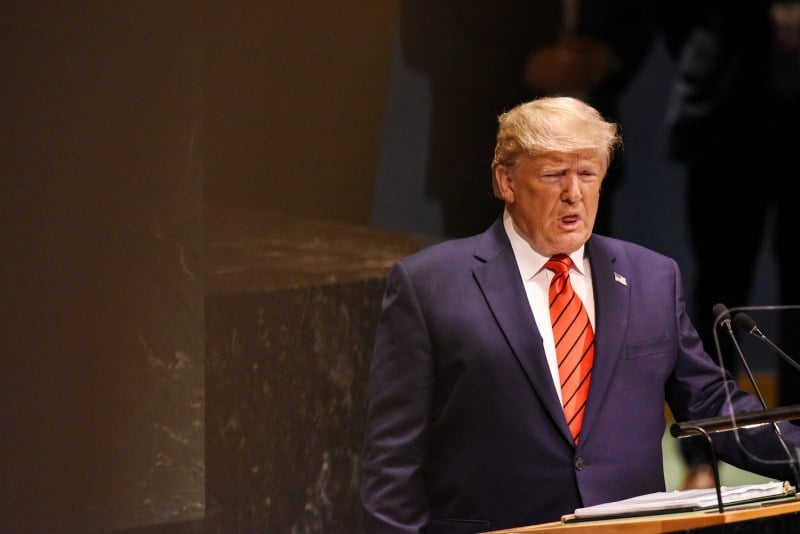By Slashing U.S. Funding for the United Nations, Trump Is Empowering China

By Slashing U.S. Funding for the United Nations, Trump Is Empowering China
Autocracies around the world stand to gain.
U.S. President of The United States, Donald Trump speaks at the United Nations General Assembly in New York City on Sept. 24, 2019. Stephanie Keith/Getty Images
In his first budget proposal since returning to office, U.S. President Donald Trump is taking a chainsaw approach to the United Nations—similar to the one he’s taken with U.S. government departments and agencies. His administration is seeking to cut billions of dollars of U.S. funding for U.N. operations, including peacekeeping missions. Shrinking support for the U.N. and similar organizations has long been a pet cause for conservative hardliners. This time, they might succeed, given congressional dynamics. If so, the result would be a seismic shift in global power—one where multilateralism survives, but increasingly on China’s terms.
The U.N. was created in the wake of World War II to advance peace and security and prevent another world war. Over time, its mission has expanded to address a wide range of topics, from development and humanitarian relief to human rights, disarmament, the climate crisis, and public health.
In his first budget proposal since returning to office, U.S. President Donald Trump is taking a chainsaw approach to the United Nations—similar to the one he’s taken with U.S. government departments and agencies. His administration is seeking to cut billions of dollars of U.S. funding for U.N. operations, including peacekeeping missions. Shrinking support for the U.N. and similar organizations has long been a pet cause for conservative hardliners. This time, they might succeed, given congressional dynamics. If so, the result would be a seismic shift in global power—one where multilateralism survives, but increasingly on China’s terms.
The U.N. was created in the wake of World War II to advance peace and security and prevent another world war. Over time, its mission has expanded to address a wide range of topics, from development and humanitarian relief to human rights, disarmament, the climate crisis, and public health.
Almost 80 years later, one can credibly argue that the U.N. has succeeded in its primary goal of preventing another global war and has done transformative work on a myriad of issues. However, one must also concede that the U.N. is anachronistic and in need of serious reform. The Biden administration sought to work within the system to improve the effectiveness and focus of multilateral institutions. The Trump administration, by contrast, seems inclined to walk away.
We already know what multilateralism looks like without the United States because we’ve tried it before. During the first Trump administration, the United States withdrew from the United Nations Educational, Scientific and Cultural Organization (UNESCO), as well as the U.N. Human Rights Council, and largely disengaged from the International Telecommunication Union (ITU).
The experience has shown that multilateralism can survive without U.S. participation. While the United States has been the U.N. system’s largest funder, it’s not the only one. If the United States steps back, its influence will fade—it will lose voting power, forfeit seats at key tables, and leave space for China to shape the agenda.
Take the ITU, led by a Chinese national from 2015 to 2022. The ITU is the world’s telecom referee, setting standards and norms for internet and satellite communications. During Houlin Zhao’s time as secretary-general, Beijing leveraged its position to promote its preferred technical standards, as well as the interests of Chinese companies. China, Russia, and other authoritarian states also pushed to impose constraints on the internet—measures that some argued could embed authoritarianism into the web’s architecture.
This is not just about great-power competition. It’s about setting the global rules of the road for how all countries operate, and many of these norms originate within the U.N. system. With the proliferation of artificial intelligence, institutions like the ITU and UNESCO will be pivotal in addressing risks such as misinformation and algorithmic bias. By removing itself from these deliberations, the United States cedes the opportunity to shape global standards, allowing countries with different views on privacy and human rights to define the future. That will ultimately disadvantage the U.S. tech companies currently leading the world in AI development.
The United States needs to decide what kind of world it wants to live in and work to shape it. Back in 1945, it designed the U.N. in its image and imprinted U.N. organizations and norms with American values. It built the greatest home-field advantage in global affairs. That doesn’t guarantee the United States always wins, but it gives the country a better shot than anyone else. It allows the United States to condemn Russia’s invasion of Ukraine, coordinate sanctions on North Korea, and mobilize joint responses to crises like the one in Haiti.
If the United States walks away from the U.N. and other multilateral institutions, it will forfeit that playbook and let others write the rules. And because U.N. hiring decisions often correlate with financial contributions, the United States will quickly and painfully realize that the U.N. staff writing the next generation of global norms won’t be American.
And for what? In 2023, the United States provided $13 billion to U.N. organizations—just 0.2 percent of the federal budget. For global influence, that’s a bargain compared to the 13 percent of the total federal budget for 2023 that it spent on defense alone.
To be sure, the U.N. is far from perfect and must be modernized for the 21st century. U.N. Secretary-General António Guterres has started a long-overdue reform process, proposing consolidation of overlapping agencies, shifting functions from costly cities like New York and Geneva to more affordable locales, and mandating staff reductions.
That’s a good start. But far bolder action is needed to reimagine where the U.N. can deliver the most value—and which legacy functions are no longer sustainable. Much of the reporting and translation functions can and should be automated. The benefits for staff should be less generous, in keeping with the standards today. And the proposed merging of agencies should eliminate many of the higher-level positions that will be made redundant. Nevertheless, this kind of structural reset will require the consensus of 193 member states—a political feat only possible through sustained and constructive U.S. engagement, relentless diplomacy, and principled compromise.
Walking away from multilateral institutions won’t create a vacuum—it will create an opening, one that China is already poised to fill. For the first time ever, the United States is skipping this month’s World Health Assembly, which is hosted by the World Health Organization (WHO), a U.N. agency that Trump withdrew from during his first term and now plans to exit again. Meanwhile, China has pledged $500 million to the WHO, replacing the United States as the largest donor and giving Beijing significant leverage to shape global health policy.
The U.N. and its sister institutions won’t vanish without the United States, but they will evolve in ways that reflect other countries’ values and priorities. In an era of rising authoritarianism and rapid technological change, that evolution won’t be neutral. The Trump administration is tired of the United States shouldering the burden for leading the world. But history shows that when democracies retreat, autocracies rush in to take their place.
This post is part of FP’s ongoing coverage of the Trump administration. Follow along here.
Jana Nelson is a former Senior Advisor at the U.S. Mission to the United Nations.
Chris Lu is a former U.S. Ambassador to the United Nations for Management and Reform.
Stories Readers Liked
In Case You Missed It
A selection of paywall-free articles

Four Explanatory Models for Trump’s Chaos
It’s clear that the second Trump administration is aiming for change—not inertia—in U.S. foreign policy.






















Join the Conversation
Commenting is a benefit of a Foreign Policy subscription.
Subscribe
Subscribe
Already a subscriber?
.
View Comments
Join the Conversation
Join the conversation on this and other recent Foreign Policy articles when you subscribe now.
Subscribe
Subscribe
Not your account?
View Comments
Join the Conversation
Please follow our comment guidelines, stay on topic, and be civil, courteous, and respectful of others’ beliefs.
View Comments
Change your username |
Log out
Change your username:
CANCEL
Confirm your username to get started.
The default username below has been generated using the first name and last initial on your FP subscriber account. Usernames may be updated at any time and must not contain inappropriate or offensive language.